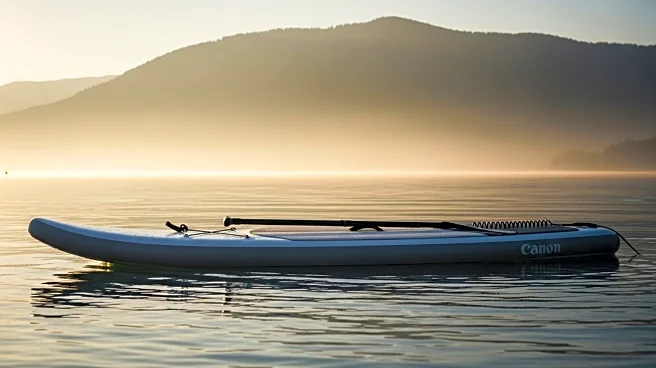What is the story about?
What's Happening?
Crispin Jones and Rachel Booton, paddleboarders from Kingsbridge, Devon, have been selected to represent Britain at the International Canoe Federation Stand-Up Paddling (SUP) World Championship in Abu Dhabi. The event is scheduled from October 29 to November 2. Both athletes expressed their excitement and pride in representing their country, and they hope that their participation will help elevate the sport's profile, potentially leading to its inclusion in future Olympic Games. Jones, who owns Waterborn SUP and provides lessons, will compete in long-distance races, while Booton, a PE teacher, will participate in technical races. The athletes believe that sprint races could be a viable option for Olympic inclusion due to their spectator-friendly nature.
Why It's Important?
The inclusion of stand-up paddleboarding in the Olympics could significantly boost the sport's visibility and popularity. For athletes like Jones and Booton, this represents an opportunity to showcase their skills on a global stage, potentially attracting more participants and investment into the sport. The decision to include new sports in the Olympics is made by the International Olympic Committee and the host city's organizing committee, with the next opportunity for inclusion being the Brisbane 2032 Games. If successful, this could lead to increased funding and development opportunities for paddleboarding, benefiting athletes and enthusiasts worldwide.
What's Next?
The immediate focus for Jones and Booton is their performance at the World Championship in Abu Dhabi. Their participation could influence discussions about the sport's future in the Olympics. The International Olympic Committee will continue to evaluate sports for inclusion, with the next selection process for Brisbane 2032 set to begin next year. Stakeholders in the paddleboarding community may advocate for the sport's inclusion, emphasizing its growing popularity and accessibility.
Beyond the Headlines
The potential inclusion of paddleboarding in the Olympics raises questions about the evolution of traditional sports and the increasing recognition of newer, less conventional activities. This shift reflects broader cultural changes, where diverse sports gain recognition and challenge established norms. The move could also inspire other niche sports to seek Olympic inclusion, promoting diversity and innovation in the sporting world.















